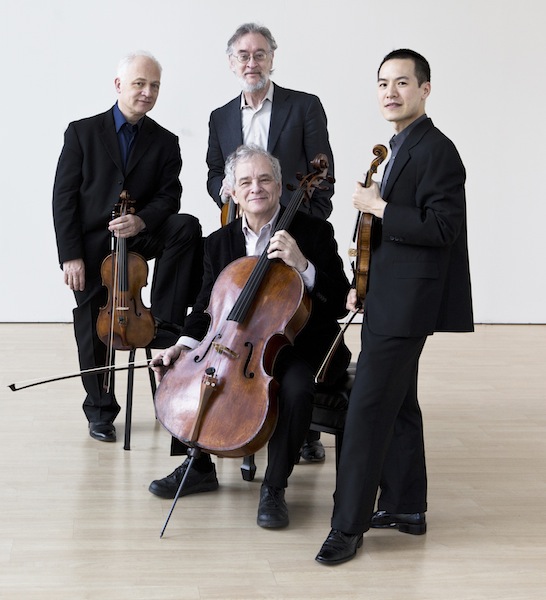Juilliard Quartet shows trademark vigor and intensity at Ravinia
Longtime admirers of the venerable Juilliard Quartet can be forgiven for any hesitancy in identifying the ensemble’s current roster. While other luminaries in the American chamber music firmament such as the Cleveland and Guarneri Quartets disbanded after a natural life span, Juilliard has soldiered on, with a dozen personnel changes in the foursome’s nearly seven decades of concerts and recordings, not to mention a remarkable 60 premiers by American composers.
Two years ago a Ravinia Festival audience witnessed the emotional departure of violist Samuel Rhodes after 44 years of service and the appointment of Roger Tapping to fill the vacancy. At the end of the 2015-2016 season, cellist Joel Krosnick will depart after 42 years, with Juilliard alum Astrid Schween taking his spot.
But the most decisive change in the quartet’s sound came in 2011 with the appointment of Joseph Lin as first violinist, a sweet-toned and fluent virtuoso who is the very antithesis of the legendary Robert Mann, the impulsive, fitfully reckless founding principal violinist who left his chair in 1996 after 50 years of service.
For its 16th appearance at Ravinia Monday, three masterpieces were delivered with trademark Juilliard vigor, a no-frills intensity that put a premium on bold, big-picture interpretations. If closer scrutiny revealed a deficit of nuance and a somewhat constrained color palette, their devoted fans in the Martin Theatre seemed unconcerned.
Haydn’s delightful String Quartet No. 29 in G Major, from his historically significant Op. 33 set (written in a “new and special way”, according to the composer), had remarkably never been performed at the hall before this concert. The opening movement unfolded in high spirits, with the quartet taking care to underline the composer’s particular brand of wit and whimsy. But balances were sometimes carelessly regulated, and the scherzo, with its implied off-beat accents, was at times heavy handed.
The music of the Second Viennese School has long been a Juilliard specialty, and the quartet’s reading of Alban Berg’s String Quartet, Op. 3 was forceful and compelling. The foursome threw themselves full bore into the work’s innate expressionist angst with explosive power. The reading of the second movement in particular captured Berg’s mood of defiance, spurred in part by a publisher’s refusal to print his previous opus.
But Berg’s quartet is also remarkable for the unprecedented wealth of micro-managed detail in this saturated score. Some of the composer’s intricate dynamic and tempo gradations were glossed over, and imprecise balances left the ear unable at times to choose a primary focal point. The rapid 12-tone opening theme was precisely etched in its first iteration by violinist Ronald Copes, but some subsequent appearances were blurred and imprecise, obscuring the effect of Berg’s wondrous development of musical materials.
Schubert’s String Quartet No. 14 in D Minor (“Death and the Maiden”) unfolded in grand fashion, the decades of accumulated experience paying handsome dividends in architectural clarity. The abundance of lyrical material and high-flying ornamental filigree gave Lin ample opportunity to shine. Extroverted sections in the middle movements were especially engaging, though melodic material in the inner voices was occasionally overcome by over-aggressive accompaniment.
The theme and variations were delivered with a captivating poignancy, though transitions seemed overly stiff and inflexible. Despite some technical uncertainties, Krosnick’s cello variation was delivered with lyrical pathos. The final Presto was an exhilarating romp, generating a boisterous reception from a grateful audience.
Posted in Performances





